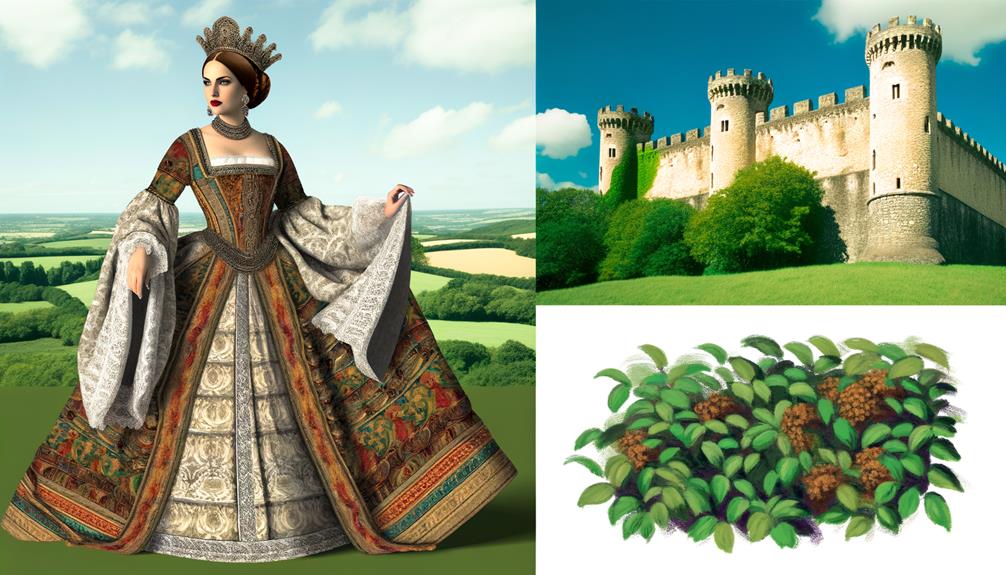Griselda Name Meaning and Origin
The name Griselda, rooted in Old Germanic origins, derives from 'gris' meaning grey and 'hild' meaning battle, portraying a figure of wisdom and enduring strength. Historically, Griselda rose to prominence in medieval literature, epitomizing patience and virtue in works like Giovanni Boccaccio's 'The Decameron' and Geoffrey Chaucer's 'The Canterbury Tales.' The name conveys cultural significance, mirroring medieval ideals of loyalty and resilience.
Though less common today, Griselda holds a rich legacy intersecting with various historical periods and cultural expressions. Those intrigued will uncover more about its profound historical and literary impact.

Key Takeaways
- Griselda originates from Old Germanic roots, combining 'gris' (grey) and 'hild' (battle).
- The name implies a seasoned warrior embodying wisdom and resilience.
- Prominent in medieval European literature, symbolizing patience and virtue.
- Used among nobility, reflecting ideals of strength and fortitude.
- Modern usage highlights its rich cultural heritage and historical depth.
Etymology of Griselda
The etymology of the name Griselda can be traced back to Old Germanic roots, specifically deriving from the elements 'gris' meaning 'grey' and 'hild' meaning 'battle.' This name has a rich history and can be found in various cultures and languages, often with different spelling variations. Griselda is also associated with the figure of a patient and faithful wife in medieval literature, particularly in Geoffrey Chaucer’s “The Clerk’s Tale.” When exploring name origins, it is fascinating to delve into the etymology and the cultural significance behind a name. For those interested in the geppetto name origins of Griselda, it is worth exploring its connections to folklore and literature.
This composite structure suggests a nuanced connotation, potentially invoking imagery of a seasoned warrior or a figure embodying wisdom and resilience. The dual elements merge to form a name that implies not just physical combat but also metaphorical battles, possibly those of life experience and endurance.
The Germanic origins indicate a cultural context where names were often imbued with symbolic attributes, reflecting societal values and the importance of personal qualities. Griselda hence serves as a linguistic artifact, encapsulating historical perspectives on strength and sagacity through its etymological composition.
Historical Context
The name Griselda gained prominence in Medieval Europe, often associated with themes of patience and virtue in literary works. Importantly, it appears in Giovanni Boccaccio's 'The Decameron' and Geoffrey Chaucer's 'The Canterbury Tales,' where the character embodies enduring loyalty and fortitude.
These historical and literary contexts provide vital insights into the cultural significance and enduring legacy of the name Griselda.
Medieval European Usage
During the medieval period, the name Griselda gained prominence through its association with literary and historical texts that portrayed its bearers as paragons of patience and virtue. This era saw the name Griselda embedded within the cultural fabric of Europe, reflecting societal values and norms.
The name's usage can be traced through various dimensions:
- Nobility and Aristocracy: Often adopted by noble families, indicating social prestige.
- Cultural Symbolism: Represented ideal womanhood, embodying resilience and fortitude.
- Historical Records: Frequently mentioned in chronicles and documents, suggesting widespread recognition.
The name Griselda resonated with the ideals of the time, making it a favored choice among those who sought to project these qualities within their families and communities.
Literary References
Through its recurrent appearances in seminal literary works, the name Griselda has been immortalized as a symbol of unwavering patience and virtue in Western literary tradition.
Giovanni Boccaccio's 'Decameron' first introduced her in the 14th century, depicting her as an epitome of marital fidelity despite severe trials. Geoffrey Chaucer subsequently adapted this narrative in 'The Clerk's Tale' within 'The Canterbury Tales,' thereby embedding Griselda's character into English literature.
Additionally, Petrarch's translation of Boccaccio's tale ensured its dissemination across Europe, reinforcing her archetypal role. These portrayals collectively underscore Griselda's endurance and fortitude, cementing her name as a literary touchstone for steadfastness and moral integrity.
The narrative's persistence highlights its profound ethical and cultural resonance.
Literary References
The name Griselda has been immortalized in literary history, prominently featured in Geoffrey Chaucer's 'The Clerk's Tale' and Giovanni Boccaccio's 'Decameron'.
Both authors present Griselda as a paragon of patience and unwavering loyalty, themes that profoundly shape her literary identity.
These seminal works have greatly contributed to the cultural and symbolic resonance of the name Griselda.
Chaucer's "The Clerk's Tale"
Geoffrey Chaucer's 'The Clerk's Tale' offers a prominent literary reference to the name Griselda, portraying her as a paragon of wifely obedience and patience. In this narrative, Griselda's character endures extreme trials imposed by her husband, Marquis Walter, to test her loyalty and submission.
Key elements of Griselda's portrayal include:
- Unwavering Patience: Despite her suffering, Griselda remains steadfast, exemplifying idealized virtues.
- Absolute Obedience: Her compliance with Walter's harsh demands underscores societal expectations of women during Chaucer's era.
- Symbolic Resilience: Griselda's trials and eventual restoration highlight themes of endurance and moral fortitude.
Chaucer's depiction of Griselda serves as a commentary on marital dynamics and the extents of human endurance, inviting readers to reflect on broader societal norms.
Boccaccio's "Decameron" Influence
Boccaccio's 'Decameron' provides a foundational context for Griselda's narrative, imbuing it with rich layers of allegory and societal critique. In the 'Decameron', the tale of Griselda is presented as the final story, signifying its thematic importance.
Boccaccio utilizes Griselda's unwavering patience and obedience to scrutinize the dynamics of power and gender within marital relationships. Her story serves as a vehicle to explore the ideals of virtue and the human condition under extreme circumstances.
Cultural Significance
Renowned across various literary traditions, the name Griselda carries significant cultural weight, symbolizing themes of patience, loyalty, and unwavering virtue. Originating from medieval European folklore, Griselda's narrative has been immortalized in several pivotal works, each reinforcing her emblematic virtues.
- Literary Influence: Griselda's tale is a cornerstone in Giovanni Boccaccio's 'Decameron' and Geoffrey Chaucer's 'The Canterbury Tales.'
- Operatic Adaptations: The story of Griselda has been adapted into numerous operas, notably by composers like Alessandro Scarlatti and Antonio Vivaldi.
- Moral Paradigm: Griselda embodies the ideal of wifely obedience and virtue, often serving as a moral exemplar in didactic literature.
The cultural resonance of Griselda's story underscores her enduring legacy in Western literary and artistic traditions.
Popularity Over Time
Over the centuries, the popularity of the name Griselda has witnessed fluctuations, influenced by literary, cultural, and social factors.
Originating in medieval Europe, the name found early prominence through literary works like Giovanni Boccaccio's 'Decameron' and Geoffrey Chaucer's 'The Canterbury Tales.' These texts embedded Griselda in the cultural consciousness, albeit variably across different periods and regions.
In the 19th and early 20th centuries, the name saw a resurgence, correlating with romanticized medievalism in literature and art. However, its usage has since waned, reflecting broader shifts in naming conventions and societal preferences.
Contemporary analysis of birth records indicates that while Griselda remains a unique choice, it does not currently enjoy widespread popularity, retaining a niche appeal.
Variations of Griselda
The name Griselda has several variations that have evolved across different cultures and languages, reflecting its widespread historical influence. These adaptations not only highlight the name's adaptability but also its resonance across diverse societies.
Some notable variations include:
- Griseldis: A medieval Latin form often found in historical texts.
- Grisel: A shorter, more modern adaptation used in Spanish-speaking regions.
- Grizelda: An alternative spelling that retains the original's phonetic charm while offering a unique twist.
Each variation maintains the core essence of the name while adapting to the linguistic and cultural nuances of their respective regions. This versatility underscores Griselda's enduring appeal and its ability to transcend geographic and temporal boundaries.
Famous Namesakes
Throughout history, several remarkable individuals have borne the name Griselda, contributing to its legacy and prominence in various fields.
One such figure is Griselda Blanco, a notorious Colombian drug lord known for her role in the Miami cocaine trade during the 1970s and 1980s. Her notoriety has enshrined the name in popular culture and historical discourse on organized crime.
Additionally, Griselda Gambaro, an influential Argentine playwright and novelist, has profoundly impacted Latin American literature with her works addressing social and political issues.
The name also appears in classical literature, most notably in Giovanni Boccaccio's 'The Decameron' and Geoffrey Chaucer's 'The Clerk's Tale,' where Griselda is portrayed as a paragon of patience and virtue.
Modern Usage
In contemporary contexts, the name Griselda continues to be used, though its prevalence has diminished compared to historical periods. This decline can be attributed to evolving naming trends and cultural shifts. However, Griselda retains a unique charm and is occasionally chosen for its historical and literary connotations. Modern bearers of the name often appreciate its rarity and the strength it conveys.
- Literary Appeal: The name Griselda is often associated with classical literature, adding an element of sophistication.
- Cultural Legacy: It carries a rich cultural heritage, particularly within European traditions.
- Evolving Trends: Contemporary naming conventions generally favor shorter, simpler names, impacting Griselda's popularity.
Despite these trends, Griselda remains a distinctive choice for those valuing tradition and depth.
Conclusion
To sum up, the name Griselda, rich in etymology, historical context, and literary allusions, has traversed centuries with unwavering elegance. Its cultural resonance and fluctuating popularity underscore its timeless allure.
Variations and notable namesakes further enrich its legacy, making Griselda a name that echoes through the annals of history with unparalleled grandeur. Modern usage continues to reflect its enduring appeal, solidifying Griselda as a name of both historical significance and contemporary relevance.






